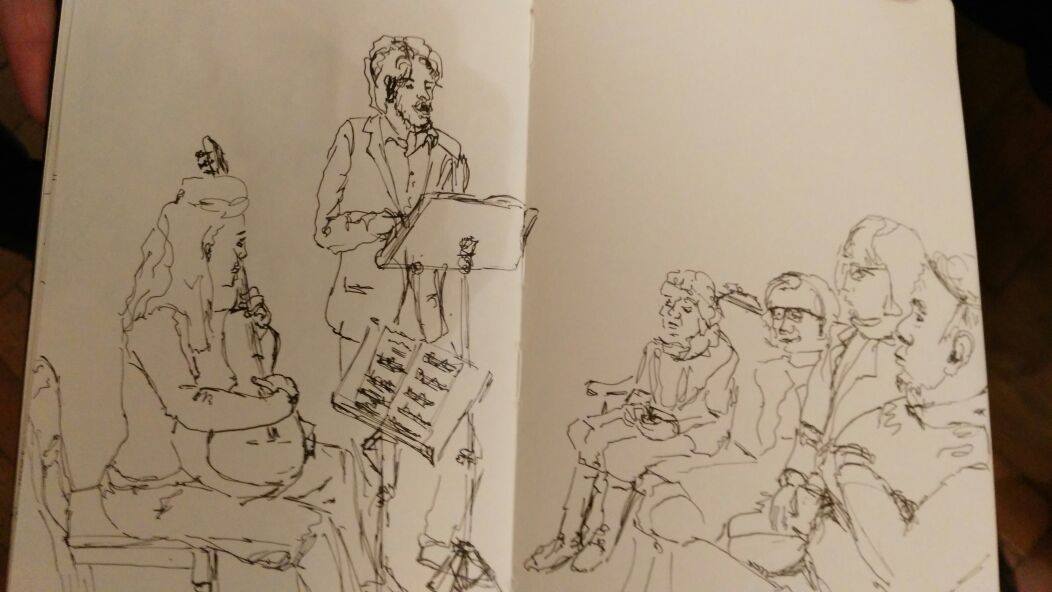Singer
Torsten Krug, born in Stuttgart in 1973, studied modern German literature, musicology and philosophy in Tübingen and completed classical singing training. After completing his master's degree, he worked as an assistant director and director at the Volkstheater Rostock and the Chemnitz Theater and was the assistant of Katharina Thalbach and Katja Paryla, among others. Since 2006 he has lived in Wuppertal as a freelance director, singer and author.
He left his tenor voice to Johannes Sorg (Aurelius-Sängerknaben Calw), Helga Spatzek (Tübingen) and Elena Fink (Wuppertal). He worked with numerous ensembles and conductors, participated in CD recordings and undertook concert tours - among others with "colla voce" and"ensemble officium" . His special passion is the song. The guitarist is a regular partner Sandra Wilhelms , the pianist Oliver Redner, the pianist Katharina Ilse and the organist and pianist Jens-Peter Enk.
Programme
winter trip
op. 89 D. 911
Franz Schubert
Based on poems by Wilhelm Müller
"I moved in as a stranger, I'll move out again as a stranger," the wanderer begins his journey into the unknown. Dreams, memories of lost happiness, poetic perception of nature, madness and moments of great tenderness appear tightly interwoven. Composed in the last year of his young life, the song cycle unfolds its existential impact to this day.
The craft of hoping
Hanns Eisler (Hollywood song book) in dialogue with Franz Schubert
The Hollywood Songbook is a collection of art songs that Eisler composed in exile in Los Angeles in 1942/43. Classic-romantic, impressionistic, expressionistic and free tonal sounds combine with echoes of hits or blues.
night and dreams
Songs by Brahms, Haydn, Schubert
"And the world begins to sing,
you just hit the magic word«
If one encounters the songs of Franz Schubert, one can believe in this famous line by Joseph von Eichendorff.
Schubert's talent falls into an epoch of geniuses who break out into the boundless, the mysterious. "Night and dreams" mark the longing of romanticism, "the common
a high meaning, to give the ordinary a mysterious aspect, to give the known the dignity of the unknown, to give the finite an infinite appearance,” says Novalis. While Romanticism came to an end as an epoch, the Romantic lives on and has an effect to this day - as an attitude in poetry, music, philosophy and in everyday life.
The program "Night and Dreams", with songs by Haydn, Brahms and above all Franz Schubert, is a journey into mysterious worlds, the dark as well as the hopeful, the good as well as the bad dreams, longing and rest.
Although chamber music with voice and guitar became increasingly popular in the 19th century, Schubert did not create any original compositions for this instrumentation. Nevertheless, he must have loved the guitar very much, since he himself played the versatile concert and harmony instrument, and many of his compositions seem to have been inspired by its sound. Such was their popularity with the (often musicians themselves) public that the publisher and composer Anton Diabelli arranged and published a number of songs for guitar, sometimes even before the original edition with piano accompaniment. The purchase price and handiness of the guitar made it the ideal companion, especially on occasions when a piano or grand piano were not available. She is able to restore an intimacy to Schubert's songs that can be lost on large concert stages.
Music for a while
Music by Dowland, Purcell,Britten
»May the music make you forget all your worries for a while«, says Henry Purcell's famous aria »Music For a While«, which gave the concert program its title. The last of three parts of the concert is dedicated to the English master of the Baroque. The finely drawn compositions from the "Orpheus Britannicus" collection reflect stirring feelings and sensitive soul impressions.
The program begins with works from the Renaissance: With texts and melodies full of melancholy, desperation, accusation, but also anticipation and devotion, John Dowland's music brings England's Elizabethan age, her royal court and her companions to life. The second part consists of settings of folk songs by the English composer Benjamin Britten. Old songs about love, seafaring, war and country life appear in Britten's modern tonal language of the 20th century.







